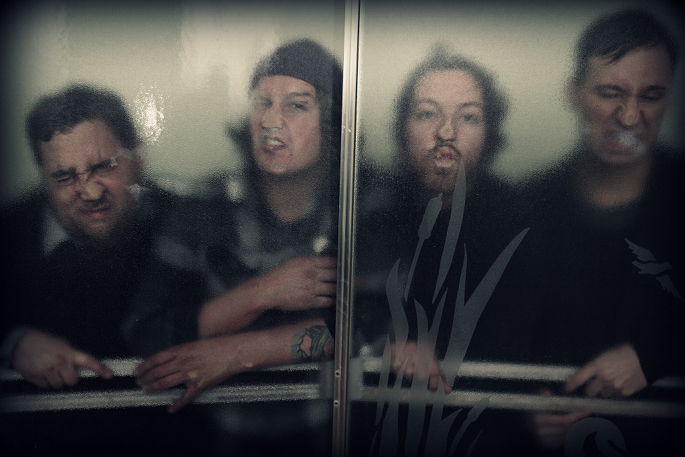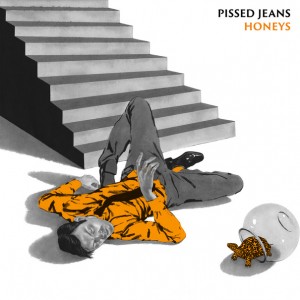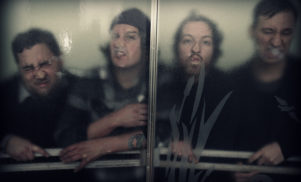Somewhat ‘grunge’ with their rapier fuzz-punk and doom-metal riffs, on the surface Pissed Jeans are what you might call quintessential Sub Pop, with the hardcore quartet’s stellar fourth album, Honeys, marking their seventh year with the imprint and four since the release of the modern classic King Of Jeans, the Pennsylvanians remain starkly at odds in outlook with the label’s classic aesthetic.
As flame-bearers of the Pacific North West’s delinquent rock tradition – spanning The Kingsman to The Wipers to Nirvana – Sub Pop have largely specialised in music of the righteous and earnest variety. We’re talking about the serious stuff here, crusading stuff: young rebellion and idealism and like, sticking it to the man. Basically the gritty business of heroic counter-culturism. Then you have Pissed Jeans.
All hail these imploding company-men, these white-collar masochists whose only contribution to heroism is a guy with a slightly sore back, jacking off in the staff toilets to the memory of water-cooler Jane. This is Pissed Jeans, who’ll die for the cause if the cause is just five more minutes in bed, whose only crusade is the cure for male pattern baldness, and whose gangrenous, sadistically physical music, couched in hysteria, becomes some kind of metaphysical comedy: more performance art than literalist crust-punk.
This is the nightmare farce of Butthole Surfers as interpreted by suicidal accountants, Revolting Cocks for the call-centre generation, led by frontman Matt Korvette’s anti-persona: a masterpiece of male impotence placed in absurd juxtaposition with the most monstrous kind of hardcore, making for a portrait of acceptable madness, drudgery and laughing into the abyss as fine as any in the canon of existentialist music. According to the handbook of pretentious theory, this tragicomic juxtaposition is what’s known as separating sign from meaning, the effect here being to make the humour horrifying and the horror hilarious. And who said Americans can’t do irony?
John Waters, Steve Martin, pop-art, even The Onion…irony has been integral to the American arts. But not, however, when it came to American hardcore, irony-free right from its West Coast origins. The Cramps, with their kitsch postmodern spin on 50s rock ‘n roll, were almost there. As were Dead Kennedys, whose music had all the characteristics of high-art parody. Biafro knew that the hammier his schlocky horror-punk, the more effective it would be as a parody of real horrors, namely the sordid misdoings of the Californian political elite. But it was only when hardcore became post-hardcore that irony showed up, especially with the arrival of that cruelest of killing jokes, Big Black. In whose wake came a crop of bands whose post-hardcore was of a vaguely absurdist tilt. Bands like Jawbox, The Residents-esque Arabs On Radar and even Fugazi, whose ‘Waiting Room’ channelled punk protest through Samuel Beckett.
But in terms of traditional American hardcore, the style has remained averse to irony since day-dot. Which is especially peculiar considering that, in first wave British punk, irony was a founding principle. A Harold Pinter buff, Johnny Rotten’s (Sid James-channeling) pantomime delivery worked like a meta-narrative, reminding the listener that, in the end, it was all a big joke, a sentiment which when combined with punk’s sonic violence created one of Pinter’s ‘comedies of menace’. From the Greek word ‘Eironeia’, meaning ‘dissimulation’, irony was in Lydon’s hands used to undercut punk’s own ‘simulation’ – the illusion that punk could save the world. It was a postmodernist snarl aimed at the ridiculousness of righteousness, which Greil Marcus claimed connected the British punks to the Situationists.
With their own comedy of menace, Pissed Jeans have brought that same Brit punk mentality to hardcore, right down to the themes of bodily disgust and sexual inadequacy that seeded British punk, from the Pistols’ ‘Bodies’ to ATV’s ‘Love Lies Limp’. Not only a funny-as-fuck band, they also unintentionally function as an art-rock band, on a par with any in America right now.
Matt Korvette: “I’m currently at work, anxious to go home and experience what might be the first significant snowfall of the winter. And to enjoy my weekend as well.”
What do you work as? It’s been the inspiration for Pissed Jeans’ funniest moments. And is it hard balancing work and the band? Do you get time off?
“Essentially I’m a corporate drone. It’s really been wearing on me lately, but yeah, a lot of my work life has been the inspiration for Pissed Jeans songs. I work the standard 40 hours/9-5 schedule, so the Pissed Jeans stuff happens at night, meaning that it’s not too hard to strike a balance. I get a good share of time off too, which is generally used for touring.”
As a teen were you always interested in mundanity? Or rather, art/music that addresses mundanity? In a very real way, your schtick evokes Kafka. What do you reckon? And do you read any of that stuff?
“It’s interesting that everyone calls our song topics ‘mundane’, because I don’t necessarily see it that way. I just discuss the things that come up in my life, the things that bother or provoke me, or the things that worry or frighten me. I think I sing a lot about love and lust, and I don’t think those are too mundane. I just want to approach topics that matter to me, so I suppose most people must think I’m kind of a boring guy if these songs are all so mundane.”
Quite the opposite. It seems a reaction to mundanity. Or rather, it’s as if what frightens you most is mundanity. ‘The Jogger’ is full of terror.
“That’s interesting… because I feel like ‘The Jogger’ is pretty mundane. Ha. Honestly I am psyched on anyone’s specific interpretations of any Pissed Jeans song, it can be pretty insightful for me.
Use your keyboard’s arrow keys to turn pages (page 1/2)
Would you consider Pissed Jeans a leftist band? By implication, there’s an anti-capitalist dimension to the Office Space-style disillusionment.
“I would definitely say so. I think it just comes from growing up in the punk scene, and questioning the world around us. I would be horrified if someone thought we were a conservative or right-leaning band.”
You mentioned in another interview you listen to ‘nice’ music as well. Any recent favourites?
“Nice recent favorites? Hmm… I’ve been digging recent albums by King Dude and Linea Aspera, although those might not be considered too nice, I guess. But mostly I spend my time seeking out horrible punk music or incredibly repetitive techno. Those generally satisfy my needs the best.”
Has having babies changed the way you think about life?
“Definitely. I think we’re all kinder, more loving people. It’s kind of hard not to be. And it definitely makes you contemplate your own mortality a bit more. It’s been great, though.”
Do you enjoy touring? What’s your favourite city to gig in?
“Touring is alright, although I feel like I’m too old to deal with the physical brutality of it – no sleep, lots of driving, eating poorly, getting physically destroyed night after night. I do love to travel though, and most places are great, but for some reason Toronto has just really struck me as a killer place to visit and play.”
What’s the reaction been to PJs from the local hardcore scene through the years? You guys are hardcore but don’t quite fit the greebo mindset. Do you get a lot of hardcore kids coming to your gigs?
“We’ve always gotten a pretty great reaction, I’d say. I definitely feel like we came out of the hardcore punk scene, and will always belong there to a degree. There are certainly hardcore kids who essentially exist just to hear the newest, most obscure bands (and consequently move past them once they’ve existed for a few months), but there’s no pleasing those types anyway. I’d rather appeal to as many different audiences as possible.”
 With your gigs, are your intentions always to create a big party, or do like to challenge the crowd. In a no wave/situationist type way?
With your gigs, are your intentions always to create a big party, or do like to challenge the crowd. In a no wave/situationist type way?
“I think it all depends on the gig. I usually have no particular plans ahead of time, it’s all about the spontaneous vibe. In certain instances, I’m perfectly content with a crowd that is standing still and quietly watching, other times it’s great when they’re going absolutely nuts and my clothes are getting ruined. It really just depends on the moment, and that’s one thing that I really like about playing shows – you really have no idea what the outcome will be until it’s over.”
What’s your Sub Pop experience been like?
“They’re the best. I can safely say that if they weren’t interested in us, we probably wouldn’t still exist as a band. They’ve just opened so many doors for us, supported us, and helped legitimize us as a band to many people who probably wouldn’t have thought of us like that otherwise.”
There’s a lot of avant-garde songs scattered around your albums. Who influences you in that respect?
“I’m not sure that we ever think about any artist in particular when writing a song, particularly a weirder one… but the first group that comes to my mind with that stuff is probably SPK.”
Yeah, I can definitely see an industrial influence in your songs…
“There’s probably a little of that! Although I am the only guy in the band who listens to much industrial. Although I guess Brad was always a Ministry fan, and we’ve shared some moments together over Type O Negative.”
Pissed Jeans’ songs’ desperation and gallows humour . “Uncomfortable fun” is how you recently described it. What, in your opinion, is the vision of life the music presents?
“I think the songs generally take a pretty negative point-of-view, but it’s kind of just like a big mental flush to get all the negativity out. Kind of like having a good cry.”
There’s also a theme of sexual shame spanning your catalogue. Were you ever worried about airing such personal feelings? You could say there’s a bravery in that.
“Well, when Pissed Jeans got started, I wasn’t really worried that anyone would have ever heard this band. I don’t think I regret any songs I’ve written, but I probably would’ve toned it down a bit if I had any idea that we’d still be a band ten years later. Or maybe I wouldn’t have, I dunno. I’m proud of my honesty, because its something that our audience has connected with. It’s way better than if I just wrote some pretty-sounding metaphors that are ultimately meaningless.”
Some call the PJs sound ‘macho’. But to me there’s always a slight tone of self-debasement subverting even the most muscular tracks. Would you agree that, whether or not intentionally on your part, the music functions as a satire on masculinity?
“Yeah, I think you’re right about that. I try to reflect on what ‘macho’ really is. I mean, consider what is expected of a male rock band, or simply of men, in America today: it’s like a mass delusion, a collective acceptance of these archaic guidelines on how to act, and what to do, in order for you to be ‘a man’. However, the fact is I am a man, and I’m trying to embrace that. But in doing that you are also susceptible to the worst male urges, manifested in institutionalized misogyny, aggression, or a sense of entitlement, etc. I suppose that Pissed Jean present the most pitiful version of manhood in order to satirize it, while the violence in the music is a way to purge us of those urges.”
How does Honeys differ from your last album?
“I don’t think thematically or sound-wise that it’s much different. If anything, we’ve focused on songs that are easier or more fun to play live, maybe, but I don’t think there are too many surprises on it for anyone who’s heard our other records.”
 How does the band’s songwriting process usually begin? With a riff or maybe a drumbeat?
How does the band’s songwriting process usually begin? With a riff or maybe a drumbeat?
“Yeah, that’s pretty much it. Pretty organically, with a riff, and then we play it a little and figure out where we want it to go. We all share input on the songs, and even when discussing each other’s instruments, even. It’s a pretty fun and good process, it can just take us a while sometimes.”
What informed the decision to work with producer Alex Newport?
“It was really just chance, based on a friend’s recommendation, but he ended up being totally great, and we purposely worked with him again. He pushes us in a good way, and shares a similarly dry sense of humour. I also think he truly ‘gets’ us, which is a huge help.”
You guys are fans of The Birthday Party. Do you feel that punk, after 30-odd years in existence, still has any value as a force for change, or a tool for shocking people or broadening minds?
“I don’t know about a force for change…perhaps on an individual scale, but I don’t picture the White House being overthrown by punks anytime soon. Personally, I just dig the way it sounds and feels, and probably always will.”









































